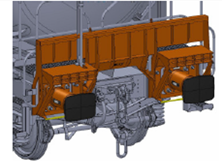Background
AnQore keeps a large fleet of rail tank cars (RTC) to ensure safe and secure logistics to and from its customers and off site storage. To ensure smooth maintenance and to spread demand, the fleet consists of various batches of RTC from different years of construction. When a part of the RTC were coming close to the end of their intended use, the AnQore procurement team took the opportunity to modernize and upgrade the fleet. The main drivers for this project were:
- Setting a new safety standard;
- Optimizing fleet utilization;
- Improving sustainability and efficiency.
Goals
- Setting a new safety standard in the acrylonitrile industry, exceeding EU legal requirements, by installing :
- A special headshield called the “Protection Shield PS02”, which is specifically developed for this RTC;
- Crash buffers with an exceptionally long deformation path to maximize the reduction of energy in case of an impact;
- Derailment detectors to immediately apply the train brakes in the event of a derailment and thereby substantially limiting the consequential damages;
- Low-noise brakes, to reduce the sound disturbance for all people and animals near the tracks;
- Anti-climbing protection in accordance with special provision RID TE 25 (a), and;
- Ensure that all markings and signs are clearly in place and robust.
- Improving CO2 footprint in transporting chemicals by designing for:
- A reduction of weight of the RTC of 5%, allowing for an increase of payload, without compromising structural integrity and strength.
Process and highlights
The opportunity to replace part of the RTC fleet was translated into the desire to build the safest rail car to date. This design was based on one of the safest RTC known at the time: Chlorine trains. AnQore significantly improved this.
Market research was done to identify the best contract partner to build the new RTC. After reference visits and meetings it turned out that the combination of Wascosa (equipment owner) and Tatravagonska (builder) best matched the ambitions and vision of AnQore.
Next, a project team was formed to a) specify the needs, b) evaluate the solutions, c) contract the work and d) to inspect and accept the prototype before the complete build process started.
All necessary inspections and authorizations, like TüV, TSI and ERA were requested and were granted.
At the time the new RTC were put in use Pieter Boon, the CEO of AnQore, shared his reflections “I am proud that we were able to successfully complete this sophisticated project with our partner Wascosa in the space of two years and that we have been able to exceed legal requirements in an impressive way. Now we have a RTC that is designed and built according to the highest safety standards and fully approved for transporting acrylonitrile. This tank wagon is clearly the new industry standard.”
Results
The new RTC is impressive and not just in terms of safety. It also represents progress and innovation in productivity and RTC design. The RTC is regarded as an ongoing development of the Wascosa safe tank car®, which was successfully introduced in 2010.
|
Objective |
How it is effected |
|
Large "headshield“ |
 |
|
Derailment detectors |
|
|
Low-noise brakes |
|
|
Anti-climb protection |
|
|
Signs |
|
|
Sustainability |
|
The deployment of this new type of RTC marks another step towards reducing the risks in our supply chain and ensure smooth supply of acrylonitrile in Europe.
